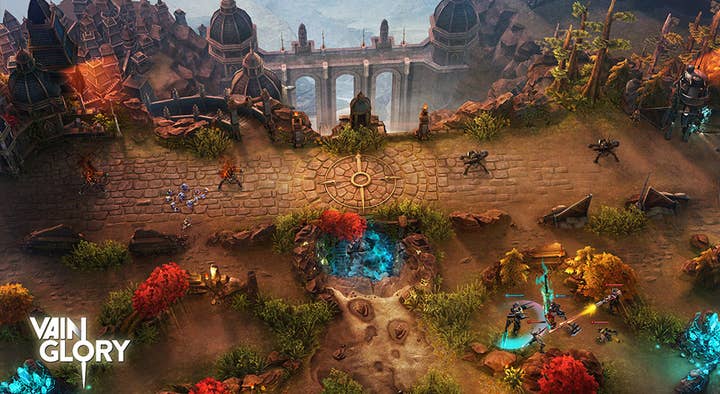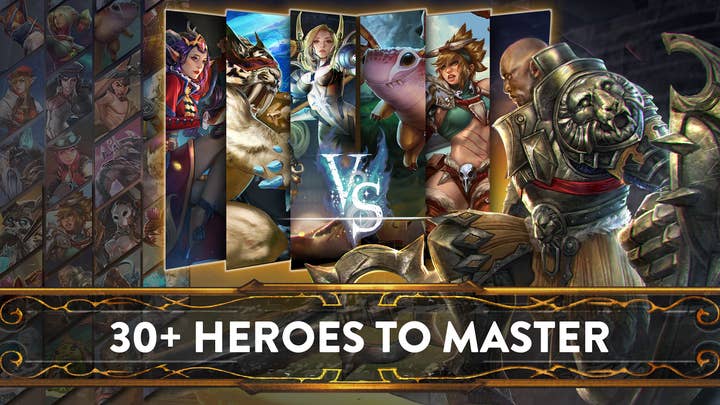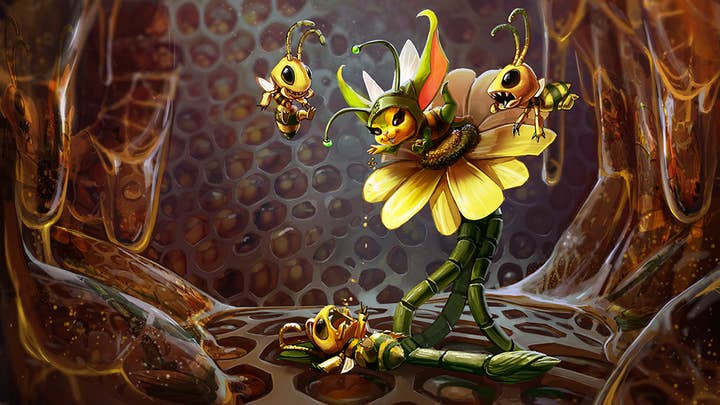"We are 'all in' on this experience. This is not a portfolio strategy"
Kristian Segerstrale maps out the future of Vainglory and mobile eSports
As a market, mobile gaming hasn't exactly been typified by careful, considered growth. Driven by an install base which has expanded to vast numbers more quickly than any other, and hitched so tightly to a galloping hardware cycle, there's been precious little chance for developers or publishers to take the long view. In mobile, by the time a trend is established, it's already being disrupted.
So it's a surprise, and a pleasant one, to find that one of the more considered and patient perspectives being taken on mobile is married to another area in which evolution has been astonishingly rapid: eSports.
Still very much a nascent format, real-time competitive gaming on mobile is fast becoming the compass point from which many of the platform's biggest players are drawing their charts. It builds loyal, engaged audiences and fits use cases and hardware USPs perfectly, tying neatly in to an always on culture full of notifications, social media integration and entertainment opportunism. Nothing quite like it has ever existed before, but the potential is obvious.

Super Evil Mega Corp is one of the pioneers. When it announced Vainglory alongside the iPhone 6 in 2014, the aim was clear: reach a mobile audience with a deep, non-trivial experience, steering very clear of exploitative or pay-to-win monetisation, with a massive emphasis on audience involvement at every stage. Since, the game has been guided by player feedback and the needs of the eSports professionals which it continues to attract, building into an IP which spans amateur and high-end play and manages to please both ends of the spectrum.
And yet, even though Super Evil has created an IP which is on trend in so many ways, the studio isn't looking to ride that wave and cash out. Instead, the plan centres on community development, player satisfaction and long-term market development. Magnanimous, astute, or just naive? We spoke to CEO Kristian Segerstrale at this year's GDC to try and find out.
Vainglory is really gathering pace as a serious eSport, and we've recently seen a slew of the top teams signing up to take part in competition and support it at the top level. That has to be a good KPI, right?
"I think saying it's a KPI is probably a little strong, but we're certainly delighted by the fact that there are more and more competitive teams getting into Vainglory. I think what I will say is that we're very excited about teams like Fnatic, Immortals, Misfits getting involved, for us it's an incredible feeling to know that those fans are going to be watching Vainglory. That's great.
"At the same time, we're equally excited by every group of friends which gets together and chooses to play the game and dedicate time to it. Our vision is a little bit different from many PC-based eSports - we really want to build an ecosystem which has multiple layers to it, where there is a really successful amateur scene where people just have fun - a little bit like soccer. Lots of layers.
"You have top teams with superstars, and maybe that's what people mostly watch, but it's also a fun activity to do with your friends"
"So yes you have top teams with superstars, and maybe that's what people mostly watch, but it's also a fun activity to do with your friends, or at college. We're really excited about the university leagues which are popping up. It's always nice to see that high-level activity, bringing in new audiences and sponsorship as a result, but equally there's a lot more happening under the surface as well."
We hear a lot about eSport as a marketing tool - do you see that high-level Vainglory play as adding an aspirational aspect for non-professionals?
"It does...to some segments of players. Fundamentally, eSports for us is not a front foot vehicle for promoting the game - we think of it more as the wake of a boat. If you do a good job, the eSports scene grows. We're excited about the waves, because it means the boat is going faster, if you see what I mean.
"It's important that we have people for whom the highest level of competition is inspiring, but we have lots and lots of people who play for fun, with friends, for the social aspect. It's a bit like tabletop games, it can be fun to play poker or monopoly or whatever, but you don't have to watch it on TV.

You've been very vocal about allowing teams and players to guide the game. There's danger that this approach can lead to design by committee, a loss of focus. In addition, you have pro teams and amateurs potentially pulling in different directions too. What's the happy medium?
"I think that the eSports community and the pro teams are a great north star for the tactical and strategic direction of the game, the ebb and flow. It's a bit like a traditional sports, at the end of the day, the tweaks we make to the game at that level are to try and make sure that it's as much fun as possible to play and watch. The key to that is that there are meaningful tactical choices to be made that are both fun for players and obvious for people who are watching so that there's some anticipation for people who are playing it out in their minds.
"From that perspective, nothing is as true as what we see in the eSports scene. But it's also true that there are many things we'll never hear from the eSports pros. Is this game easy enough to learn? Can I have a meaningful experience if I don't want to spend all night playing, but just have five or ten minutes? So we're focusing on having two main modes for Vainglory. One is classic, which is that long experience which will evolve on its own, and to which we're adding five vs. five later this year - that's the all night experience. But separately we're developing several brawl modes, which are five minute games where we're deliberately not worrying too much about its viability in a competitive environment. It's just as much fun as you can have in five minutes. That helps a little bit to unbundle it, it means we don't have to try and squeeze so many aspects into a single experience.
"In some ways I do think that regions like SE Asia are showing the way that the next generation experiences the world, which is touchscreen first"
"I think the feedback we get from the competitive community shows that it's in exactly the right hands: the hands of the people who, frankly are better players than we are. But that doesn't mean that they have all of the answers for every development direction of the game."
Where do you see the developing markets for Vainglory? As a game for high-end phones, are the growth markets the one we normally hear about for mobile gaming?
"It's interesting. The style of experience which we're building....I think the fastest adoption of a game like Vainglory, which fundamentally scratches the same itch as a long form PC or console style game is in markets where PC and console aren't actually that big. So if you look at markets like South East Asia, South America, where mobile first is already an obvious thing.
"In the West, Vainglory has grown very rapidly from players who have turned away from PC, or no longer have a console, but are looking for that experience. In SE Asia or South America, it's growing in a very different way. People there are saying 'I didn't even know this was possible. I don't know what a MOBA is, but I'm going to play it.'

"In some ways I do think that regions like SE Asia are showing the way that the next generation experiences the world, which is touchscreen first. Whether that's Snapchat or Instagram, or whatever. They don't go to PC, their smartphone is their primary device. Building a premium game experience which respects that obvious has faster growth potential in places where that is as true as it can be.
"It's interesting that mobile gaming grew up to fill those five minute 'bus stop' moments where I'm not on my couch or at my PC, where I would normally play games, so I can play on the go. Well, the vast majority of the world's population isn't just playing on the go, they're playing at home, everywhere. I think Vainglory can grow fastest where that is the culture.
"For us, it's still so early. We're localised in 16 different languages. We have local community managers in most of our markets and languages. We consider almost all of our markets to be early adopter markets. Places in SE Asia where we see Vainglory in the top ten are more mature for us in some ways. We think there's a psychographical set of boundaries for the game than geographical.
The sort of customer engagement you're building, and with competitive games and eSports in general, tend to result in an extended lifecycle. Do you see these trends stabilising the historically mercurial mobile market?
"I don't know that any games market has ever been truly stable. Look at music games - they came, were huge, then they really went. I think there are certain styles of games which seem to be far more stable in the way that they work, and they tend to be games which perform specific roles in communities. I remember playing Counter Strike back in 2002 and thinking it was super fun. CS:GO is not that different to the original and is still growing stronger every year.
"I think from our perspective, as a company, is that we know that someone over the next five or so years, will do as good a job with a competitive experience on this platform as Valve or Blizzard have on PC. We're committed to being a company which helps to bring that about. There will be others, no doubt. We will make missteps. We have bad days and great days. The commitment we are giving to our community is that we will work with them to figure this out over time, whatever that means.
"These things take time and sometimes you have to wait for the insights of others to help you figure things out. We are 'all in' on this experience. This is not a portfolio strategy - we're not going to make a match 3 game and a racing game and whatever and just see what sticks. On a macro level the market is absolutely moving towards a real time, multiplayer, team based experience. In some ways we have a great head start, but the company which is going to win this, we don't think is going to win by launching a big sudden hit. It's about working with a community to build a game which works for them."
